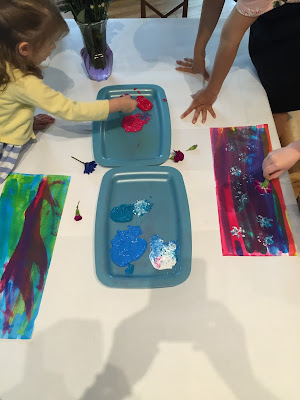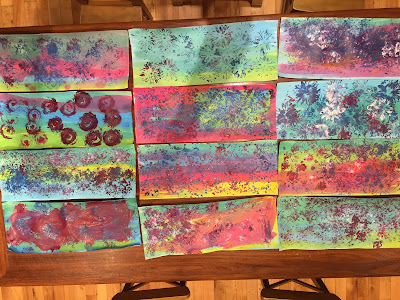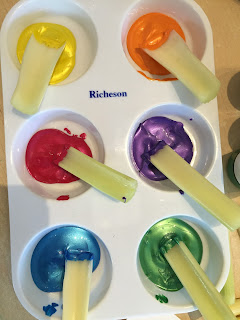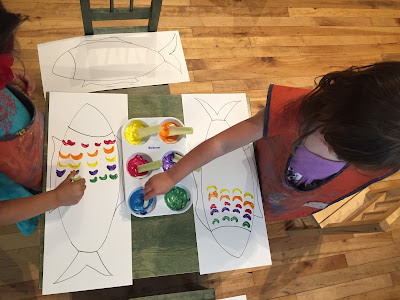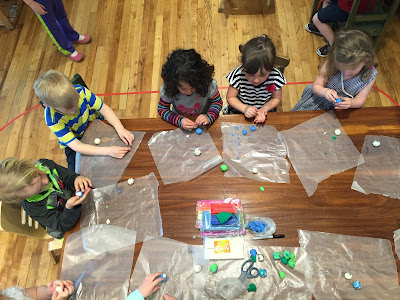From tracing around bodies and feeling tickled to experiencing the size of ones body and just how much paint it takes to paint it. The children really loved being traced and then painting themselves. Such a simple project really and yet so very rewarding especially when you stand back and look at everyone.

We used simple materials for this project. Recycled drafting paper, markers, and tempera paint.

We also looked at Monet. I've done other projects on Monet with the children and this one was different in that we used real flower for stamping our impressions. I set up two stations for this project. We had a table with water colours and the children were really applying the paint very quickly. The idea was to watch the colours bleed together. There was so much discussion about what happens when blue and yellow mix to make green and red and blue to make purple. After the water colour was applied we move to the next painting station.
The children applied acrylic paints with flowers. They absolutely loved pressing the flowers into the paint and then stamping their water colour painting. the effect was really quite stunning.
We talked about Monet and his many famous paintings and his style of painting.

We also experimented with small canvases and rubber bands. Turns out that was so much easier for the children to use than string. We had the children wrap the canvases with rubber bands and then we stamped water colour paint on the canvases. When the stamping was done we threw salt on the painting to see if it would create an interesting effect.



Another project we did was inspired by our love of metal insets! I pulled out all kinds of circles for tracing. Rolls of tape of varying sizes and lids from containers and of course our circle metal inset for tracing. After all the tracing the children were invited to colour in their circles with either marker or water colour paints. This project was so simple and so very beautiful. Each child's creation was so very different and beautiful.
We did a lot of outtings. We went to water parks, play grounds and to see a puppet show.


We made marble art with shaving cream and liquid water colour. I really love liquid water colour. The colour is so very intense that I've been using it when I make play dough as well. It's so much more vibrant than food colouring.
For this project the children sprayed shaving cream into a large tray and then we used droppers to apply the liquid water colour. Then the children mixed the colours with tooth picks and popsicle sticks. We used special water colour paper and pressed it into the shaving cream. You MUST use water colour paper for this project. The water colour paper really absorbs the paint and the marbling. When you lift off the paper you use a scraper to scrape the shaving cream away to reveal a most beautiful marble painting.

We tried Bubble painting. Using water colours again and straws and soap to create colourful bubbles. Once the bubbles were big enough the children pressed their water colour paper on to the bubbles to collect their bubble impression. This was fun. It was fun to make the bubbles and then see them appear on the paper like magic!
We made rainbow fish. Based on the story Rainbow Fish. I've had metallic paints for a while that I've been waiting to use. We used celery to stamp the scales out on the fish and when the paint was dry we had the children go over the fish with orange and blue water colour paints.

Our last project was painting with water balloons. This was slippery and fun and the children really loved getting their hands messy. Again, lots of colour choice and colour mixing for the children. we really encouraged mixing and stamping. The glossy yellow paper was donated a few years ago and I had been saving it for this kind of project. We used Acrylic paints which really hold up beautifully on the glossy paper.
So, that is a wrap on art camp. I really love doing art and I feel it is so important for children to make art. To many early learning environments don't do enough of this. Children need artful experiences like they need love. Art is love.





